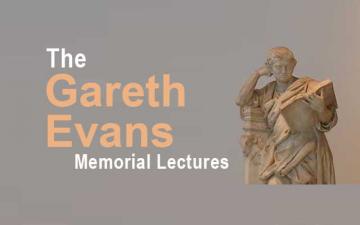The Gareth Evans Memorial Lectures
Gareth Evans was Tutorial Fellow in Philosophy at University College and, subsequently, Wilde Reader in Mental Philosophy. Widely regarded as one of the leading philosophers of his generation, Evans died in 1980 at the age of 34. The Faculty holds this annual lecture in his memory.
In our 2nd edition of Oxford Philosophy, Radio and TV presenter Paul Gambaccini tells of his time as a PPE student at University College and the influence of his philosophy tutor, Gareth Evans.
The 2026 Gareth Evans Memorial Lecture
Professor Tania Lombrozo (Princeton University)
Title
To follow

Abstract
To follow
Details
The Trinity Term 2026 Gareth Evans Memorial Lecture will take place at 5pm on Tuesday 12th May in the 10 Merton Street Lecture Room at University College, Oxford.
Professor Manuel García-Carpintero (Universitat de Barcelona)
'"Fictive Stance" vs. Mere Pretense Views of Fictionality'

Abstract
How should we think of the utterances that convey fictions? Developing a standard take in the analytic tradition already adopted by Frege and casually endorsed by Austin, Kripke, van Inwagen and many others, MacDonald (1954) and Searle (1975) argue that they are mere pretense – the simulation of acts like assertions or questions. They don’t constitute sui generis, dedicated representational practices with a specific point, force or "stance", fictionalizing, on a par with those defining asserting or requesting. Alward (2009), Predelli (2019, 2020), and Recanati (2021) still endorse the view, but Walton (1990) and others provide decisive objections, predicated on its lack of explanatory power. In the paper I'll defend the specific version of the "fictive stance" view that I endorse by developing some of its explanatory virtues. In particular, I'll consider two that Searle mentions in support of his view, the creation of fictional characters and the presence of assertions in fiction. I'll also discuss the extent of "reality" principles, and the selection among conflicting interpretations.
Details
The Trinity Term 2025 Gareth Evans Memorial Lecture took place at 5pm on Tuesday 27th May in the 10 Merton Street Lecture Room at University College, Oxford.
Professor Mark Sainsbury (University of Texas at Austin)
‘“Adequate Ideas”: Evans on thought and language’

Details
The Trinity Term 2024 Gareth Evans Memorial Lecture took place at 5pm on Tuesday 21st May 2024 in the 10 Merton Street Lecture Room at University College, Oxford.

Professor John Campbell (Berkeley)
Singular Causation and Free Will
Details
The Trinity Term 2023 Gareth Evans Memorial Lecture took place at 5pm on Tuesday 23rd May 2023 in the 10 Merton Street Lecture Room at University College, Oxford.

Professor Mark Johnston (Princeton)
How the Liquid Self Corrodes Ethical Life
Abstract
Over the last half-century or so, much has been said about the corrosive effect on ethics of “scientism” or scientific naturalism; the view that the ontology of a completed basic natural science, say future physics, will provide an “alphabet of being” with respect to which everything present in space and time is a word or a sentence or a paragraph or a novel or a library built up from that alphabet, by modes of combination which the natural science in question can make fully intelligible. Scientism has been charged with deracinating the meaning of human life; with entrenching skepticism about the authority of traditional values, including truthfulness itself; and with obliterating teleology from history and so from our informed understanding of history, thereby leaving us in a condition of liquid post-modernity in which all meta-narratives appear as laughably unempirical and defensive stories that serve to mask the arbitrary evolution of material events and of technological and financial power.
By and large, Anglophone academic ethics has remained calm in the face of such claims, even though many of its practitioners either endorse scientific naturalism or see no viable alternative to it.
As a matter of temperament, I also prefer calm. But I have discovered a series of arguments that begin with the variety of naturalistic conceptions of the self and proceed to demonstrate that with the exception of hedonistic utilitarianism and its ilk, ethics is bunk if scientific naturalism is true. In the lecture I explain some of these arguments, and invite you to help me with my resultant disquiet.
Details
The Trinity Term 2018 Gareth Evans Memorial Lecture took place at 5pm on Tuesday 5th June 2018 (Week 7) in the TS Eliot Lecture Theatre, Rose Lane, Merton College, Oxford.

Professor Peter van Inwagen (Notre-Dame)
Pronouns, Variables, Properties and Relations'
Abstract It is a popular view that the variables of the “canonical notation of quantification” are, or are essentially, third-person-singular pronouns. This view of pronouns is developed in some detail. It is shown how to understand expressions like '∀x∃y x loves y’ and ‘∀x∃y y loves x’ as abbreviations of sentences of a “Revised English” in which the role played by variables is played by a single third-person-singular pronoun (‘it’), each occurrence of which has an occurrence of ‘something’ or ‘everything’ as its antecedent. This understanding of the canonical notation of quantification is, first, applied to some issues in the philosophy of quantification, such as quantification into non-nominal positions and “perplural” quantification, and, secondly, to raise a difficult problem about finding names for non-symmetrical relations.
Details
The Michaelmas Term 2016 Gareth Evans Memorial Lecture took place at 5pm on Tuesday 18 Oct 2016 (Week 2) in the TS Eliot Lecture Theatre, Rose Lane, Merton College, Oxford.

Professor Sarah-Jane Leslie (Princeton)
'Cultures of Genius: Why women are underrepresented in certain academic disciplines'
Abstract
Some academic disciplines have significant gender gaps (e.g., philosophy), while others do not (e.g., molecular biology). Sometimes, the phenomenon is characterized in terms of the natural sciences/mathematics having large gender gaps, and the social sciences/humanities having small or no gender gaps. This is a crude characterization, as reflection on disciplines such as philosophy vs. molecular biology illustrates. Are there any general, isolable factors that predict the occurrence of gender gaps across all academic disciplines, and also within the broad domains of natural sciences/mathematics, and social sciences/humanities? My collaborators and I have found that one such factor may be academics' beliefs about what is required for success — in particular, the extent to which innate, immutable, natural talent is emphasized, at the expense of hard work and dedication, predicts the presence and extent of a discipline’s gender gap. In this talk I present the original data in support of the hypothesis, along with several other in-progress studies, which shed light on how these beliefs are communicated, the mechanisms by which they operate to discourage women's participation, and their developmental trajectory. Our findings concerning the latter point suggest that even very young girls are vulnerable to being discouraged by such messages.
Details
The Trinity Term 2015 Gareth Evans Memorial Lecture took place at 5pm on Tuesday 9 June 2015 (Week 7) in the Gulbenkian Lecture Theatre, St Cross Building, Manor Road. (Faculty of Law:map)

Professor Susanna Siegel (Harvard)
'The Epistemological Significance of Top-Down Effects on Perception'
Abstract
How does perception differ from reasoning? It is often thought that we reason from information we take ourselves to have already, whereas perception is primarily a way of taking in new information. Sometimes our reasoning is influenced by what we antecedently want or fear, whereas perceptions are commonly thought to be free from such influence. As against this picture, I identify a range of ways in which perceptual experiences could result from processes that are psychologically isomorphic to reasoning. I argue that perceptual experiences can be instruments of confirmation bias, and that when this happens, some of the epistemic norms that we apply to beliefs apply to perceptual experiences as well.
Details
The Michaelmas Term 2012 Gareth Evans Memorial Lecture took place at 5pm on Tuesday 13 Nov 2012 (Week 6) in the Gulbenkian Lecture Theatre, St Cross Building, Manor Road.

Professor François Recanati (Institut Jean-Nicod)
'Mental Files and Identity'
Abstract
Mental files serve as individual or singular concepts. Like singular terms in the language, they refer, or are supposed to refer. What they refer to is not determined by properties which the subject takes the referent to have (i.e. by the information stored in the file), but through relations to various entities in the environment in which the file fulfils its function. Files are based on acquaintance relations, and the function of the file is to store whatever information is made available through the relations in question.
I offer a typology of files. The most important distinction is between proto-files and conceptual files. In contrast to proto-files, conceptual files can host not only information derived through the specific relation on which the file is based, but also information about the same object gained in some other way.
In this framework identity comes into the picture twice. (i) Identity is presupposed when two pieces of information occur in the same file. Such ‘presumptions of identity’ ground the linguistic phenomenon of de jure coreference, which takes place when two singular terms, or two occurrences of a singular term, are associated with the same file. (ii) Judgments of identity work by linking two distinct files, thereby enabling information to flow freely between them. This corresponds to de facto coreference. (Linking is not merging ; identity judgments have the effect of merging files only when the files belong to a very specific category, that of ‘encyclopedia entries’ — a type of conceptual file based on a higher-order relation rather than on a specific acquaintance relation.)
In the last part of the talk I will discuss, and attempt to rebut, two objections to the mental-file account. According to the first objection, the account is circular ; according to the second objection, de jure coreference cannot be accounted for it in terms of identity of the associated mental files because de jure coreference is not a transitive relation.
Details
The Hilary Term 2011 Gareth Evans Memorial Lecture took place at 5pm on Tuesday 25 Jan 2011 (Week 2) in the Gulbenkian Lecture Theatre, St Cross Building, Manor Road.
Professor Ronald Dworkin (NYU)
'Truth in Interpretation'
Abstract
The lecture will defend a theory about the possibility and character of truth in interpretation across all its genres: literature and art, history, law, psychodynamics, sociology, philosophy and conversation.
Details
The Trinity Term 2010 Gareth Evans Memorial Lecture took place at 5pm on Tuesday 18 May 2010 (Week 4) in the Gulbenkian Lecture Theatre, St Cross Building, Manor Road
Professor Christopher Peacocke (Columbia University, New York and University College, London)
'Self-Consciousness'
Abstract
Self-consciousness is something more specific than consciousness. An umbrella characterization of a self-conscious state is that it is one in whose content the subject features as an element, and features as himself. I distinguish two varieties of such self-consciousness, and discuss their significance and relations. One variety of self-consciousness can be called perspectival self-consciousness. I propose an account of the nature of perspectival self-consciousness, and consider its relations to: Gallup’s mirror test for self-consciousness; Shoemaker’s conception of immunity to error through misidentification; to the possession of a conception of many minds; to some of the Sartre’s ideas on what it is to conceive of oneself as an object; and to the mirror-neuron phenomena. A second variety of self-consciousness can be called reflective self-consciousness. I offer a characterization of this too, its epistemological significance, and consider the ways in which perspectival self-consciousness and reflective self-consciousness have to cooperate if a thinker is to attain certain epistemic goals. I conclude with some reflections on the bearing of the metaphysics of subjects of consciousness, and the metaphysics of their properties, on the explanation of epistemic and conceptual phenomena.
Details
The 2010 Gareth Evans Memorial Lecture took place at 5pm on Tuesday 2 Mar 2010 (Week 7) in the Gulbenkian Lecture Theatre, St Cross Building, Manor Road.
Professor Elliott Sober (University of Wisconsin-Madison)
'Parsimony Arguments in Science and Philosophy'
Abstract
Parsimony arguments are advanced in both science and philosophy. How are they related? In this lecture, I'll describe the justifications that attach to two types of parsimony argument that occur in science. In the first, parsimony is a surrogate for likelihood. In the second, parsimony is relevant to estimating how well a model will predict new data when fitted to old. I'll then consider how these two justified forms of argument might apply to the mind/body problem.
Details
The 2009 Gareth Evans Memorial Lecture took place at 5pm on Tuesday 10 Feb 2009 (Week 4) in the Gulbenkian Lecture Theatre, St Cross Building, Manor Road.
Professor John McDowell (Pittsburgh)
'Avoiding the Myth of the Given'
Abstract
Not Available
Details
The 2007 Gareth Evans Memorial Lecture took place at 5pm on Tuesday 8 May 2007 (Week 3) in the Gulbenkian Lecture Theatre, St Cross Building, Manor Road.
Professor Richard Heck (Brown University)
'Composing Thoughts from Senses'
Abstract
Not Available
Details
The 2006 Gareth Evans Memorial Lecture took place at 5pm on Tuesday 23 May 2006 (Week 5) in the Gulbenkian Lecture Theatre, St Cross Building, Manor Road.
Professor Stephen Yablo
'Non-Catastrophic Presupposition Failure'
Abstract
My topic will be the problem of presupposition failure. The claim will be that there is no such problem - more like an opportunity of which natural language takes extensive advantage. The last two sentences are a case in point. The first was, "My topic will be the F"; the second was, "There is no F." If the second sentence is true, then the first suffers from presupposition failure, hence it should strike us as compromised or undermined. That it doesn't shows that presupposition failure need not always have the result that (as Strawson puts it) "the whole assertive enterprise is wrecked." I will sketch a theory of how catastrophe is avoided in such cases, and speculate on the larger philosophical implications.
Details
The 2005 Gareth Evans Memorial Lecture took place at 5pm on Tuesday 31 May 2005 (Sixth Week) in the Gulbenkian Lecture Theatre, St Cross Building, Manor Road.
Professor Tim Scanlon (Harvard)
'Means and Ends'
Abstract
The paper examines the idea that we should treat others as ends in themselves, and never merely as means, and it attempts to identify the sources of the moral appeal of these ideas. Do they offer a general characterization of moral wrongness? Or a way of identifying a particular sort of wrong? The paper distinguishes these two aims and draws also on the distinction between wrongness and the meaning or significance of an action.
Details
The 2004 Gareth Evans Memorial Lecture took place at 5pm on Tuesday 16 November 2004 (Sixth Week) in the Gulbenkian Lecture Theatre, St Cross Building, Manor Road.





